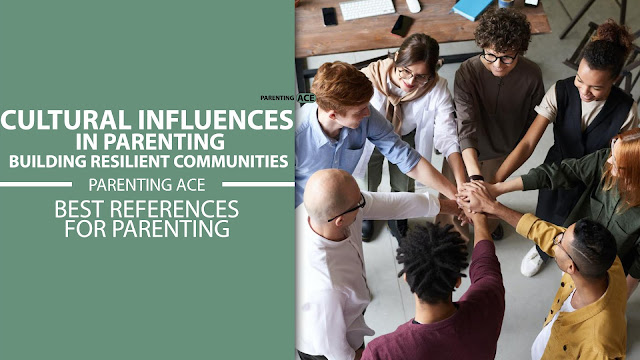Cultural Influences and Diversity in Parenting: Fostering Strong Bonds and Resilient Communities
In a world characterized by cultural diversity, the social dynamics of parenting take on a multifaceted and nuanced form. Cultural influences shape parenting practices, family dynamics, and community resilience in profound ways. In our upcoming blog post, we delve into the intricate interplay between cultural diversity and the art of parenting, exploring how embracing and understanding cultural differences fosters strong bonds within families and resilient communities. Join us as we uncover the richness of cultural influences on parenting and discover how these insights can shape a more inclusive and compassionate approach to raising the next generation.
 |
| Cultural Influences in Parenting: Building Resilient Communities |
Parenting is not only a universal experience but also one deeply influenced by cultural norms, values, and traditions. As societies become increasingly diverse, understanding the role of cultural influences in parenting is crucial for fostering strong bonds between parents and children and building resilient communities. This article explores the intricate interplay between cultural diversity and the social dynamics of parenting, highlighting the importance of embracing and celebrating cultural differences in nurturing healthy families and communities.
Understanding Cultural Influences on Parenting
Cultural influences shape every aspect of parenting, including child-rearing practices, discipline strategies, and familial roles. In collectivist cultures, such as many Asian and African societies, there is a greater emphasis on interdependence and communal values, leading to more collaborative and group-oriented parenting styles. On the other hand, individualistic cultures, like those found in Western societies, prioritize autonomy and independence, resulting in parenting approaches that emphasize personal achievement and self-expression.
Moreover, cultural beliefs and traditions often dictate how parents engage with their children and transmit cultural heritage. For example, storytelling may be a common practice in some cultures to impart moral values and cultural identity to children, while rites of passage ceremonies mark significant milestones in others. Understanding these cultural nuances is essential for promoting cultural continuity and preserving the rich tapestry of traditions within diverse communities.
Challenges and Opportunities of Cultural Diversity in Parenting
While cultural diversity enriches the parenting experience, it also presents challenges related to navigating cultural differences and fostering inclusive parenting practices. Immigrant families, in particular, may grapple with balancing traditional cultural values with the demands of adapting to a new cultural environment. This process, known as acculturation, can lead to conflicts between generations and identity struggles among children caught between two cultures.
However, cultural diversity in parenting also presents opportunities for mutual learning and growth. By embracing cultural differences and engaging in cross-cultural dialogue, parents can broaden their perspectives, cultivate empathy, and strengthen their parenting skills. Furthermore, diverse communities benefit from the exchange of cultural knowledge and practices, fostering resilience and cohesion in the face of adversity.
Promoting Inclusive Parenting Practices
To promote inclusive parenting practices that honor cultural diversity, communities must provide support and resources that recognize and respect various cultural backgrounds. This includes culturally sensitive parenting education programs, accessible language services, and culturally relevant parenting materials.
Additionally, fostering intercultural understanding and collaboration among families from different backgrounds is essential for building resilient communities. Initiatives such as multicultural parenting groups, community celebrations of cultural festivals, and interfaith dialogues create opportunities for meaningful connections and mutual support.
Cultural influences and diversity profoundly shape the social dynamics of parenting, influencing child-rearing practices, family relationships, and community resilience. By recognizing and embracing cultural differences, parents can nurture strong bonds with their children and contribute to the creation of inclusive and resilient communities. As we navigate the complexities of cultural diversity in parenting, let us celebrate the richness of our cultural heritage and work towards building a more interconnected and compassionate world for future generations.



Comments
Post a Comment